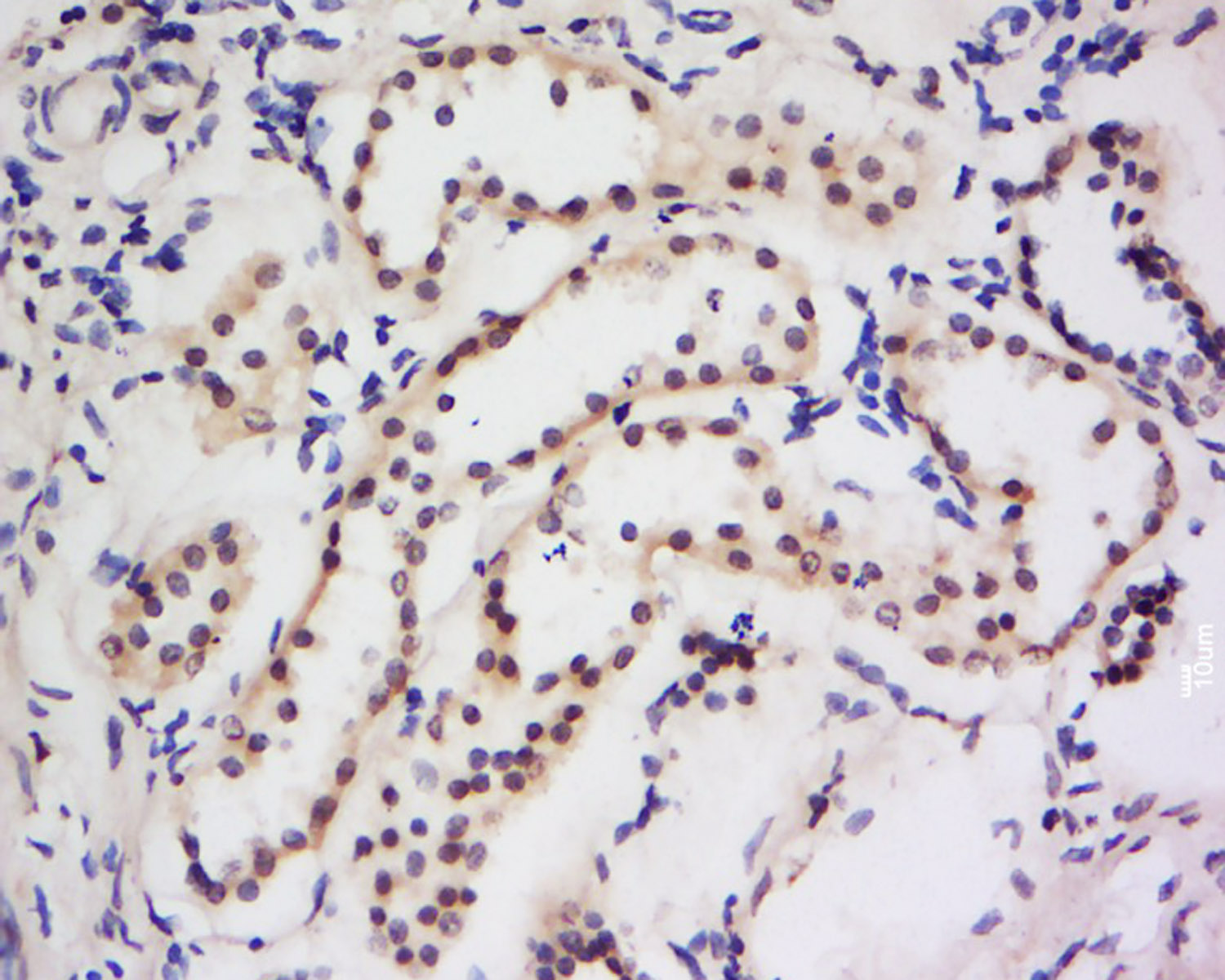Dymeclin Rabbit pAb
Dymeclin Rabbit pAb
- 产品详情
- 实验流程
- 背景知识
Application
| IHC-P, IHC-F, IF |
|---|---|
| Primary Accession | Q7RTS9 |
| Reactivity | Human, Rat |
| Predicted | Mouse, Dog, Horse, Sheep |
| Host | Rabbit |
| Clonality | Polyclonal |
| Calculated MW | 75935 Da |
| Physical State | Liquid |
| Immunogen | KLH conjugated synthetic peptide derived from human Dymeclin |
| Epitope Specificity | 151-250/669 |
| Isotype | IgG |
| Purity | affinity purified by Protein A |
| Buffer | 0.01M TBS (pH7.4) with 1% BSA, 0.02% Proclin300 and 50% Glycerol. |
| SUBCELLULAR LOCATION | Cytoplasmic and Golgi Apparatus |
| SIMILARITY | Belongs to the dymeclin family. |
| SUBUNIT | Interacts with GOLM1 and PPIB. |
| Post-translational modifications | Myristoylated in vitro; myristoylation is not essential for protein targeting to Golgi compartment. |
| DISEASE | Defects in DYM are the cause of Dyggve-Melchior-Clausen syndrome (DMC) [MIM:223800]. DMC is a rare autosomal recessive disorder characterized by short trunk dwarfism, microcephaly and psychomotor retardation. Electron microscopic study of cutaneous cells of affected patients shows dilated rough endoplasmic reticulum, enlarged and aberrant vacuoles and numerous vesicles. DMC is progressive. Defects in DYM are the cause of Smith-McCort dysplasia (SMC) [MIM:607326]. SMC is a rare autosomal recessive osteochondrodysplasia characterized by short limbs and trunk with barrel-shaped chest. The radiographic phenotype includes platyspondyly, generalized abnormalities of the epiphyses and metaphyses, and a distinctive lacy appearance of the iliac crest, features identical to those of Dyggve-Melchior-Clausen syndrome. |
| Important Note | This product as supplied is intended for research use only, not for use in human, therapeutic or diagnostic applications. |
| Background Descriptions | Dyggve-Melchior-Clausen syndrome (DMC), a rare autosomal recessive disorder, is characterized by microcephaly, short trunk dwarfism and sometime psychomotor retardation. Cutaneous cells of affected individuals show dilated rough endoplasmic reticulum and enlarged vacuoles. The Dyggve-Melchior-Clausen syndrome protein, also designated dymeclin, may play a role in proteoglycan metabolism and intracellular protein digestion. It is a widely expressed multi-pass membrane protein, detected primarily in chondrocytes and fetal brain tissue. Defects in dymeclin are also the cause of Smith-McCort dysplasis syndrome (SMC), which has characteristics identical to those of Dyggve-Melchior-Clausen syndrome. |
| Gene ID | 54808 |
|---|---|
| Other Names | Dymeclin, Dyggve-Melchior-Clausen syndrome protein, DYM |
| Target/Specificity | Expressed in most embryo-fetal and adult tissues. Abundant in primary chondrocytes, osteoblasts, cerebellum, kidney, lung, stomach, heart, pancreas and fetal brain. Very low or no expression in the spleen, thymus, esophagus, bladder and thyroid gland. |
| Dilution | IHC-P=1:100-500,IHC-F=1:100-500,IF=1:100-500 |
| Storage | Store at -20 °C for one year. Avoid repeated freeze/thaw cycles. When reconstituted in sterile pH 7.4 0.01M PBS or diluent of antibody the antibody is stable for at least two weeks at 2-4 °C. |
| Name | DYM |
|---|---|
| Function | Necessary for correct organization of Golgi apparatus. Involved in bone development. |
| Cellular Location | Cytoplasm. Golgi apparatus. Membrane; Lipid-anchor. Note=Sequence analysis programs clearly predict 1 transmembrane region. However, PubMed:18996921 shows that it is not a stably anchored transmembrane protein but it weakly associates with the Golgi apparatus and shuttles between the Golgi and the cytosol |
| Tissue Location | Expressed in most embryo-fetal and adult tissues. Abundant in primary chondrocytes, osteoblasts, cerebellum, kidney, lung, stomach, heart, pancreas and fetal brain. Very low or no expression in the spleen, thymus, esophagus, bladder and thyroid gland |
For Research Use Only. Not For Use In Diagnostic Procedures.
Provided below are standard protocols that you may find useful for product applications.
BACKGROUND
Dyggve-Melchior-Clausen syndrome (DMC), a rare autosomal recessive disorder, is characterized by microcephaly, short trunk dwarfism and sometime psychomotor retardation. Cutaneous cells of affected individuals show dilated rough endoplasmic reticulum and enlarged vacuoles. The Dyggve-Melchior-Clausen syndrome protein, also designated dymeclin, may play a role in proteoglycan metabolism and intracellular protein digestion. It is a widely expressed multi-pass membrane protein, detected primarily in chondrocytes and fetal brain tissue. Defects in dymeclin are also the cause of Smith-McCort dysplasis syndrome (SMC), which has characteristics identical to those of Dyggve-Melchior-Clausen syndrome.
终于等到您。ABCEPTA(百远生物)抗体产品。
点击下方“我要评价 ”按钮提交您的反馈信息,您的反馈和评价是我们最宝贵的财富之一,
我们将在1-3个工作日内处理您的反馈信息。
如有疑问,联系:0512-88856768 tech-china@abcepta.com.























 癌症的基本特征包括细胞增殖、血管生成、迁移、凋亡逃避机制和细胞永生等。找到癌症发生过程中这些通路的关键标记物和对应的抗体用于检测至关重要。
癌症的基本特征包括细胞增殖、血管生成、迁移、凋亡逃避机制和细胞永生等。找到癌症发生过程中这些通路的关键标记物和对应的抗体用于检测至关重要。 为您推荐一个泛素化位点预测神器——泛素化分析工具,可以为您的蛋白的泛素化位点作出预测和评分。
为您推荐一个泛素化位点预测神器——泛素化分析工具,可以为您的蛋白的泛素化位点作出预测和评分。 细胞自噬受体图形绘图工具为你的蛋白的细胞受体结合位点作出预测和评分,识别结合到自噬通路中的蛋白是非常重要的,便于让我们理解自噬在正常生理、病理过程中的作用,如发育、细胞分化、神经退化性疾病、压力条件下、感染和癌症。
细胞自噬受体图形绘图工具为你的蛋白的细胞受体结合位点作出预测和评分,识别结合到自噬通路中的蛋白是非常重要的,便于让我们理解自噬在正常生理、病理过程中的作用,如发育、细胞分化、神经退化性疾病、压力条件下、感染和癌症。






